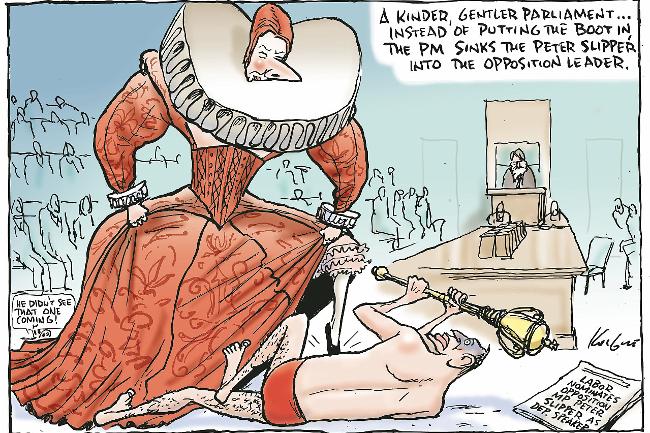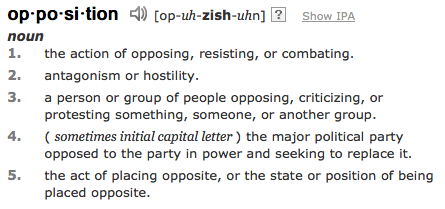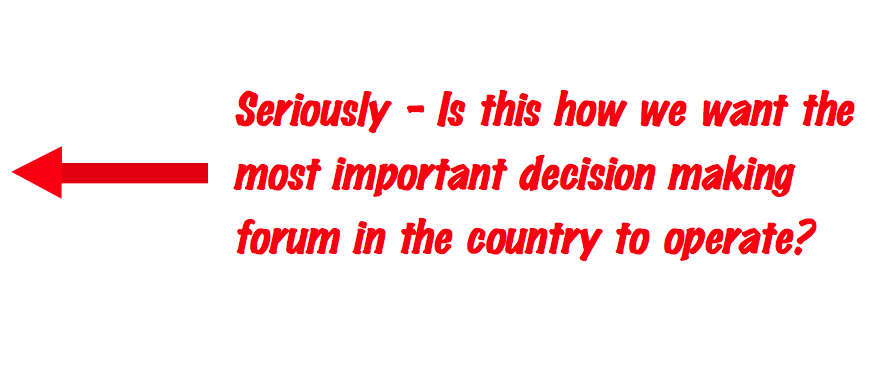Is “Opposition” really doing us any good?
I’ll put my cards on the table up front for this one: I have an equal disregard for both sides of politics here in Australia and I view the next election as the ultimate vote between a rock and a hard place. So much so in fact, that I’ll consider an informal protest vote. Now, many people throw their hands in the air at such a notion saying “but what if everybody did that?” to which I provide an honest response mirroring Catch 22’s Yossarian saying “Well if they did, I’d certainly be foolish to do otherwise.”
The old Aussie adage of “Not voting for them because it only encourages them” as cynical as it is, has a depth of hard-earned wisdom beneath it.
An experience last week highlights my cynicism in these matters.
In my pursuit of getting a new conservation project off the ground I recently attended a function where Opposition Communications Spokesperson, Malcolm Turnbull spoke about the current roll-out of the National Broadband Network. Now I would not normally have bothered attending such a function in the knowledge that I have grass at home I can watch grow, but I was keen to touch base with the Opposition Spokesperson for the Environment who was in attendance. (In addition, Turnbull is perhaps one of the few politicians we have with the nous to understand that different contexts demand different political approaches and that any serious response to issues should be determined by pragmatism, and not solely by a political ideology.)
During his address the Opposition Spokesperson made a number of very salient points that seem to have been overlooked or glossed over by the current Government. The nature of these is not relevant here, but having been one of the very few people to have rolled out a large cable network during my days in Papua New Guinea, I can say with great certainty he made a lot of sense. At the very least, the points he raised deserved serious contemplation by those in attendance.
Not so…
There was a former sitting member in the audience that was compelled to question and make accusations during the time allocated for questions (Perhaps old habits from our cringe-worthy Parliamentary Question Time die hard?) The thing that struck me was the person’s compulsion to take an oppositional and adversarial approach to many of the points raised. Not only was it very apparent to many in attendance that he had not actually listened to the speech, but it was clear that he was so intent on “opposing” everything that was said, he automatically dismissed the potential benefit contained therein.
The nature of the response and it’s adversarial intent had other unintended consequences across the assembled group. A substantial amount of time was taken up that would have been better served allowing the local community to ask their own questions of the Minister. From my vantage point I could see a great deal of frustration at a political agenda being played out, and in doing so denying the opportunity for others to interact with the speaker.
The interaction was merely one that we see played out daily in our political arenas from all sides of politics. Politicians have developed a dominant paradigm of opposition, and in fervently opposing everything their colleagues across the floor do and say, they lose sight of the very reason they are elected. The perceived importance of the political process itself has out-stripped that of the intended outcomes of that same process.
When we default to solely adversarial interaction we deny ourselves the opportunity of fully exploring the subject-mater at hand. If the argument becomes about winning, any fact unrelated to the winning of the argument becomes irrelevant and is ignored. We often see this in the judiciary where the Prosecution will be in possession of facts that would in fact aid the Defence if shared and vice versa. All of the facts will not emerge as the “winning” of the case outweighs the importance of a full exploration of the matter at hand.
Language is one of the methods through which we make sense of the world and direct our behaviour. If the language is couched in the negative it’s little wonder the resultant interactions tend toward the negative. The word Opposition readily springs to mind here. Dictionary.com defines opposition as follows:
If this is the name, language and purpose ascribed to almost half of our sitting members of Parliament, we have a system named, couched and directed toward adversarial interaction. There is of course always a place for robust, opposing views via debate, however when one side rules by majority any real debate is easily subverted.
From hard earned experience with bureaucrats I know the system will not be overhauled to make it a more co-operative and beneficial one, the status-quo good, bad or indifferent will always be defended. We might however, make a start with some simple adjustments and see what happens from there.
The first thing would be to change some language. I would suggest the removal of the “opposition” word altogether. I would instead select a word that takes the adversarial nature out of the descriptor of “those who currently do not form Government” (The Opposition). Perhaps we could use words like Alternate Spokesperson, Alternate Leader or Alternative Govt? Our language shapes a lot of our thinking, so who knows how a subtle change in language might impact thinking over time?
I wonder also what might happen if we did attempt to overhaul the system to make the Parliament a more collaborative and more productive forum? What would happen if opposition was not the automatic default position of all concerned? What would happen if we forced our politicians to think more broadly and view topics from multiple perspectives before making decisions? What might happen if they started working in unison rather than in opposition? More important still … What would happen if they actually started to make better decisions?
It is actually possible to have a more productive and beneficial Parliament despite what supporters of the status-quo say, it simply needs to be co-designed in a collaborative and cooperative manner.
Imagine our elected representatives collaborating and cooperating in the National interest? Maybe that is a bit too much of a stretch.
As a side note, within a week of writing this, the Parliament has descended into a vitriolic-circus once again with our leaders (and I use the leaders term very loosely) attempting to use the Speaker’s indiscretions to political advantage and attacking one another with little regard to their own self-respect or the job they are being paid handsomely to do.




I can’t agree with this post more!